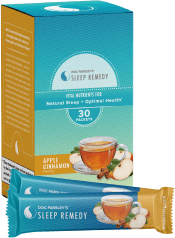Do Naps Affect Nighttime Sleep?
“Do naps affect nighttime sleep?”
This is a common question that I get. And it makes sense that we think this could happen, especially with someone who isn’t sleep deprived.
But the reality of napping is that it’s a bit more complex (of course) than just whether you do it or not.
For the purposes of this article, let’s just refer to our “main block of sleep” as “nighttime sleep.”
If you’re a shift worker, treat this article as advice about how to nap outside of your main sleep window.
So, let’s get into what types of naps affect nighttime sleep.
We’ll discuss the types of naps that are beneficial to use, when “napping” turns into a “full sleep,” and how you can use these different types of sleep most effectively for your goals.
What is the definition of a nap?
Believe it or not, napping isn’t just “sleep you do during the day.”
While experts still can’t seem to agree on a definition of sleep itself, we can agree that timing is a key factor.
The same is true for napping.
To make things simple, a nap is defined as any amount of time spent asleep between 15 minutes and 120 minutes (2 hours).
If you’re asleep for 121 minutes, that’s technically just “sleep.” I know, that’s getting in the weeds, but a line needs to be drawn somewhere.
Interestingly, once you get into that 121+ minutes of sleep, that does interfere with nighttime sleep.
The reason for this interference has to do with how long a sleep cycle lasts.
One sleep cycle is anywhere from 90-120 minutes. This differs from person to person and even just day to day.
Once you drift into the territory of more than one sleep cycle, you’re telling your body that you’ll be there for a while and that is when a nap will affect your actual nighttime sleep later.

Does the time of day for a nap matter?
YES.
If you’re within 3 hours before your bedtime, naps affect nighttime sleep.
Think about it: you’re basically trying to turn your “sleep mode” on and off too quickly. It takes your body about 3 full hours to wind down for nighttime sleep, so you don’t want to interfere with that process by waking it up and then putting it back down soon after.
But if you’re trying to nap at any other part of the day, you’re good to go.
What are the benefits of napping?
Naps are good for restoring performance in general, even if you’re getting adequate sleep at night.
Especially for those who have tough, long, or stressful days – naps are the way to go when you need a little bit more of a “push” to get all those things done.
Some notable benefits of napping include:
- Restored mental clarity
- Improved creativity
- Physical repair
- Improved executive function in the brain
But here’s the thing: different lengths of time spent napping produce different benefits.
So let’s get into what type of nap is best for you and your goals.
Spend your time napping for different goals
The length of time spent napping will get you different benefits, so it’s good to know which ones you’re going for.
Here’s the breakdown of the different types of naps and what each one helps with:
Short naps (15-30 minutes)
Short naps are useful when you want to boost your creativity.
On days when you’re just not feeling those ideas come in, give yourself a quick break for some shut-eye and see how your brain works after a few minutes of napping.
Medium length naps (30 minutes – 60 minutes)
Medium naps are best for:
- Cognitive function
- Executive function
- Skill solving
- Problem solving
If you’re finding yourself stuck on a project at work, this is the amount of time you want to allow yourself to sleep for that mental boost to push through.
Heck, it might even bring you clarity on those harder issues you’re working out.
Long naps (60 minutes – 120 minutes)
Longer naps are where you’ll start to experience the physical repair benefits.
The cool thing about this time frame is that you also get the benefits of the shorter naps on top of body restoration.
So if you’ve got the time to do it, this is the true “power” nap, in my opinion.

So…why not take a nap?
If you needed it, here’s your permission slip to take more naps.
They’ve clearly got a lot of benefits and can help even the best of nighttime sleepers.
But if you find yourself napping because your nighttime sleep isn’t the way you want it to be, check out my Sleep Remedy supplement.
It’s non-addictive and made to help people regulate their sleep naturally.
If you’d like to learn more about it, check it out here:

